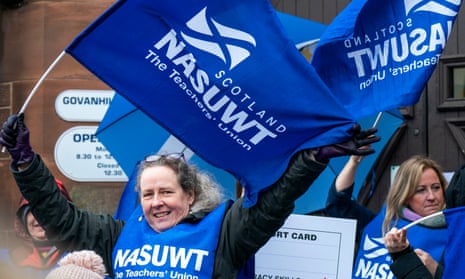Labour challenges Sunak to say how much money he 'wasted' by taking jet from London to Leeds for visit
Labour has challenged Rishi Sunak to say how much money he “wasted” by using a jet to travel from London to Leeds yesterday. (See 12.31pm.) Angela Rayner, the deputy Labour leader, said:
Families will be rightly angered by this show of extravagance by Rishi Sunak.
Patients and staff are crying out for action from this government in the midst of a crisis in our NHS while the prime minister jets from London to Leeds for a photo op.
The prime minister must come clean about how much taxpayers’ money was wasted on this 36-minute plane journey for a three-hour visit at the height of a cost of living crisis.

Key events
A&E doctors criticise plans to treat patients in temporary cabins in hospital car parks

Denis Campbell
A&E doctors have criticised plans to spend millions of pounds on treating patients in temporary cabins in hospital carparks to relieve the intense strain on emergency wards. (See 10am.)
The plan was a key element of the measures to address the crisis in the NHS that Steve Barclay, the health secretary, announced in the Commons on Monday.
But the Royal College of Emergency Medicine, which represents the UK’s A&E doctors, said that cabins do not work and will not reduce ambulance crews’ long waits to hand over patients.
Dr Adrian Boyle, the college’s president, said:
We urge the government not to revisit the pre-emergency department cohort areas that have been tried, tested and have not worked many times over. These are not effective and will not reduce ambulance waiting times.
These only move corridor care into ‘temporary structures’ built in car parks that become rapidly full. We know it is much safer to have post-emergency department cohort areas.
And Boyle’s deputy, Dr Ian Higginson, the RCEM’s vice-president, posted a message on Twitter saying plans like this “don’t work and don’t solve anything”.
Once again short term funding in answer to a predicted long term problem. And are we really back to tent-equivalents in car parks? They don’t work and don’t solve anything. Time for long-term investment in social care, permanent beds, primary care, and the NHS workforce. https://t.co/NVgsQwjPJO
— Ian Higginson 🌈 (@RCEM_VP) January 10, 2023
TUC says it's holding national 'protect right to strike' day on 1 February to mobilise opposition to anti-strike bill
The TUC has announced that it is holding a “protect the right to strike” day on Wednesday 1 February to mobilise opposition to the government’s anti-strike bill. Paul Nowak, the TUC’s general secretary, said:
On 1 February we will we hold events across the country against this spiteful new bill – which is unworkable and almost certainly illegal.
We will call on the general public to show support for workers taking action to defend their pay and conditions, to defend our public services and to protect the fundamental right to strike.
The TUC said that the day would involve events being held in different parts of the country and that further details of the events being planned would be announced later this month.
At the afternoon Downing Street lobby briefing the PM’s spokesperson said the government expected its new strikes (minimum service levels) bill to become law this year. That is what you would expect, because the current session of parliament is due to end in the autumn, and it is unusual for bills to be carried over from one session of parliament to the next.
But, in an acknowledgement that the bill will face opposition, particularly in the House of Lords, the spokesperson said its progress would be “dependent on parliamentarians”.
As the Mirror’s Dan Bloom points out, even though government ministers have repeatedly described this as legislation for “minimum safety levels” rather than “minimum service levels”, which is the standard term for this sort of law (the acronym, MSL, is the same), the word safety does not appear in the bill at all.
Some key points about the Bill:
- Minimum service levels can be imposed on unions *after* they've already named a date of a strike
- Bill does not once refer to "safety", despite Grant Shapps' attempts to sell it that way
cont.
How the government's anti-strike law will work
The strikes (minimum service levels) bill only runs to 12 pages (which, for a major government bill, is very short). It sets an outline for how minimum service levels would work, but the exact details of what minimum service levels would be (for example, how many ambulances would have to be available during an ambulance strike, or how many teachers would have to work during a teachers’ strike) are matters for consultation, and are not set out in the bill.
Under the current law, provided a union organises a strike in accordance with rules set out in the Trade Union and Labour Relations Act 1992, the union cannot be sued for damages, and workers cannot be sacked. This bill would change that because, to continue to enjoy those protections, unions and individuals would have to comply with the minimum service level (MSL) legislation.
How the new law would work – for government
The law would give the secretary of state the power “to make regulations providing for levels of service where there are strikes in relevant services, which are defined as ‘minimum service regulations’”.
In a briefing last week, the government said it would definitely use the new MSL powers in fire, ambulance and rail services, but in the other sectors covered by the bill (other areas of health, education, nuclear decommissioning and border security), it would look to negotiate voluntary minimum service level agreements first. But this distinction does not apply in the legislation.
How the new law would work – for employers
Under the law, the government will set minimum service levels. But it will be up to the employer to tell unions how many workers would have to show up on a strike day to ensure MSLs are achieved.
It would do this through work notices. The explanatory note with the bill say:
Work notices are the mechanism that puts minimum service levels into practice for particular strikes in relevant services. The work notice may be given by the employer to the trade union and will identify the people required to work to secure that the levels of service set out in the minimum service regulations are provided on a strike day.
The bill says employers would have to issue a work notice after receipt of notice that a strike is going ahead, but at least seven days before the strike starts (or later, if the union agrees). The employer is not allowed to say that more people are needed to work than are “reasonably necessary” for the MSL to be maintainted.
How the new law would work – for unions and employees
Under the bill unions would have to take “reasonable steps” to ensure its members comply with the work notice. If the union fails to do this, it could be sued for damages for the consequences of the strike – although it would only be liable for damages caused by its not complying with the law; it would not not have to pay damages for losses that would have been suffered by the employer anyway.
And workers who go on strike on strike day would lose their automatic protection from unfair dismissal if the work notice says they should be working, provided that “their employer has (before the strike day) given the employee notice of the work specified in the work notice that they are required to carry out on the strike day and a statement that they must comply with that work notice”.
Doctors' leader says discharge plan must be properly funded to stop 'unsustainable pressures' just being shifted to GPs

Denis Campbell
GPs fear that the government’s plan to discharge thousands of hospital patients into care homes could lead to family doctors becoming even more overloaded.
The Royal College of GPs today voiced concern that the move to help the NHS cope with its intense winter crisis by freeing up hospital beds will add to the pressure on already-overstretched GP surgeries.
The health secretary, Steve Barclay, yesterday announced plans for the NHS to spend £200m buying up places in care homes to take 2,500 discharged patients who were deemed medically fit to leave. That would ease hospital overcrowding and reduce the amount of time ambulance crews spend outside A&Es waiting to unload a patient.
Prof Kamila Hawthorne, the chair of the RCGP, told the Guardian she supported the policy in principle as “the right thing to do”. However, family doctors are already “working to our limits right now” and could not easily become responsible for even more patients, many of whom are likely to be frail and elderly.
She said:
NHS pressures are being felt right across the health service, including in general practice. GPs and our teams have a vital role supporting patients in the community, including when they have been discharged from hospital and when they are waiting for hospital treatment.
But we are working to our limits right now, making more consultations every month than before the pandemic, yet with fewer trained, full-time equivalent GPs. It is the right thing to do to look for ways to safely move patients out of hospital when they are well enough to leave but not necessarily well enough to go home and look after themselves, both to create capacity in hospitals for the many other patients who need beds but also because it is more cost-effective and generally because people want to be cared for closer to their homes.
But, Hawthorne added:
Any such initiative must be properly resourced and staffed otherwise it is just shifting unsustainable pressures from one area of the health service to another, and again risking patient safety.
Government publishes strikes (minimum service levels) bill
The government has now published the strikes (minimum service levels) bill.
The bill itself is here.
And the explanatory notes are here.
Labour challenges Sunak to say how much money he 'wasted' by taking jet from London to Leeds for visit
Labour has challenged Rishi Sunak to say how much money he “wasted” by using a jet to travel from London to Leeds yesterday. (See 12.31pm.) Angela Rayner, the deputy Labour leader, said:
Families will be rightly angered by this show of extravagance by Rishi Sunak.
Patients and staff are crying out for action from this government in the midst of a crisis in our NHS while the prime minister jets from London to Leeds for a photo op.
The prime minister must come clean about how much taxpayers’ money was wasted on this 36-minute plane journey for a three-hour visit at the height of a cost of living crisis.

GMB says Shapps's claim it risked lives by not negotiating national safety levels during last strike 'outrageous slur'
As ITV’s Anushka Asthana reports, the GMB union has issued a response to Grant Shapps’s claim earlier that the GMB, and other unions representing ambulance staff, have been putting lives at risk because of their failure to negotiate national-level minimum service standards on strike days. (See 1.15pm.) It says this is an “outrageous slur”.
Jonathan Gullis (Con) says he used to be a represenative for the NASUWT teaching union. But he criticises the National Education Union, claiming it is led by “Commie [Kevin] Courtney” and “Bolshie [Mary] Bousted”.
Joanna Cherry (SNP) asks Shapps to confirm that the TUC is right to say these proposals will almost certainly be illegal. (See 9.43am.)
Shapps says this bill is compliant with the European convention on human rights.
Shapps criticises the RMT for not putting the latest pay offer to its members. Because of that, members will not be aware of the full details.
He urges the RMT to change this.
Back in the Commons Jeremy Corbyn, the former Labour leader, asks Grant Shapps if he can imagine the stress levels of public sector workers who have gone a decade with frozen pay. He says they are going on strike because they are desperate.
Shapps says it is not true to say workers have not had a pay rise for 10 years.
And he urges Corbyn to consider the stress felt by people who can’t get to work, or who are waiting for an ambulance.
Trade unions to discuss coordinated ‘day of action’ strike across public sector
Trade unions are to meet to discuss holding a coordinated “day of action” across the public sector in an attempt to maximise pressure on the government to give workers a better pay deal, my colleague Denis Campbell reports.
Richard Burgon (Lab) says this bill is part of an “alarming authoritarian drift”.
Shapps says this is “ludicrous”. He wonders if Burgon knows that happens in truly authoritarian countries.

 1 year ago
99
1 year ago
99










 English (US)
English (US)